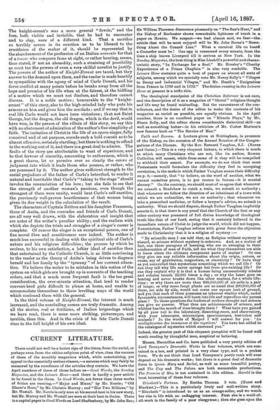Faith and Reason. A Lecture given at Nottingham, in presence
of the Bishop, on the occasion of the Annual Reunion of the Congre- gations of the Diooeee. By the Rev. Bernard Vaughaa, 52. (Burns and Oates.)—This is a very eloquent lecture, in which there is much to which many Christians who are not, like its author, Roman Catholics, will assent, while from some of it they will be compelled to withhold their assent. For example, we do not think that most Protestants would formulate the difficulty they feel in accepting revelation, in the mode in which Father Vaughan states their difficulty on p. 9,—namely, that " to believe, on the word of another, what we cannot ourselves prove, is to pat reason in fetters—it is mental slavery." On the contrary, we should most of us agree that whenever we consult a Bradshaw to catch a train, we submit to authority ; that whenever we follow the direction of an inhabitant of a town with which we are unfamiliar, we act on authority ; that whenever we take a prescribed medicine, or follow a lawyer's advice, we submit to authority. What we should dispute, though Father Vaughan implicitly asserts it, is that there is any proof that the Church of the first or any other century was possessed of fall divine knowledge of theological truth like that of oar Lord, seeing that it certainly believed in the immediate return of Christ to judge the world, which did not happen. Nevertheless, Father Vaughan refutes with great force the objection made to Christianity that it is a religion of mystery :- " By scientific men I am told that, as Religion without mystery is. absurd, so science without mystery is unknown. And, as a matter of fact, can these paragons of learning, who are so sweeping in their condemnation of men of Faith, tell me what they themselves are able to know about the ultimate component parte of matter? Or can they give me any reliable information about the origin, nature, or cause, say of gravitation, magnetism, or electricity ? Or have they as yet unravelled that myeteriona something which we call life ? Or can they tell why life never springs but from preexisting life ? Or can they explain why it is that a human being unconsciously inhales and exhales breath 23,000 times a day ; or why the heart goes on beating and never breaks down like other engines, for a whole life- time ; or why there are more than 800,000,000 of air-cells in a pair of lungs; or why some fungi plants are so small that 200,000,000 of them, set side by side, would not cover one square inch of ground, and yet that each of them possesses an inherent vitality which, under favourable circumstances, will burst into life and reproduce the parent plant ? To these questions the leaders of modern thought and science can give no answer. What then are achievements of science, and whither has the march of time brought them ? What have you gained by all your toil in the laboratory, dissecting-room, and observatory, with your telescopes, microscopes, spectroscopes, test-tubas and scalpels ? In the words of Moigno I will answer for you ' La multiplication des inconnues et des mystdres.' You have but added to the catalogue of mysteries which surround you."
Indeed, the greater part of this eloquent pamphlet will be found well worth reading by thoughtful men, sceptical or believing.
Messrs. Macmillan and Co. have published a very pretty edition of Lord Tennyson's Dramatic Works in four volumes, which are con-, tamed in a box, and printed in a very clear type, and in a pocket form. We do not think that Lord Tennyson's poetic rank will ever depend on his dramatic works ; but there is a great deal of dramatic force in Queen Mary and Becket, as well as some beautiful poetry, and The Cup and The Falcon are both memorable productions. The Promise of May is not contained in this edition. Harold is the least interesting of these four volumes.


































 Previous page
Previous page